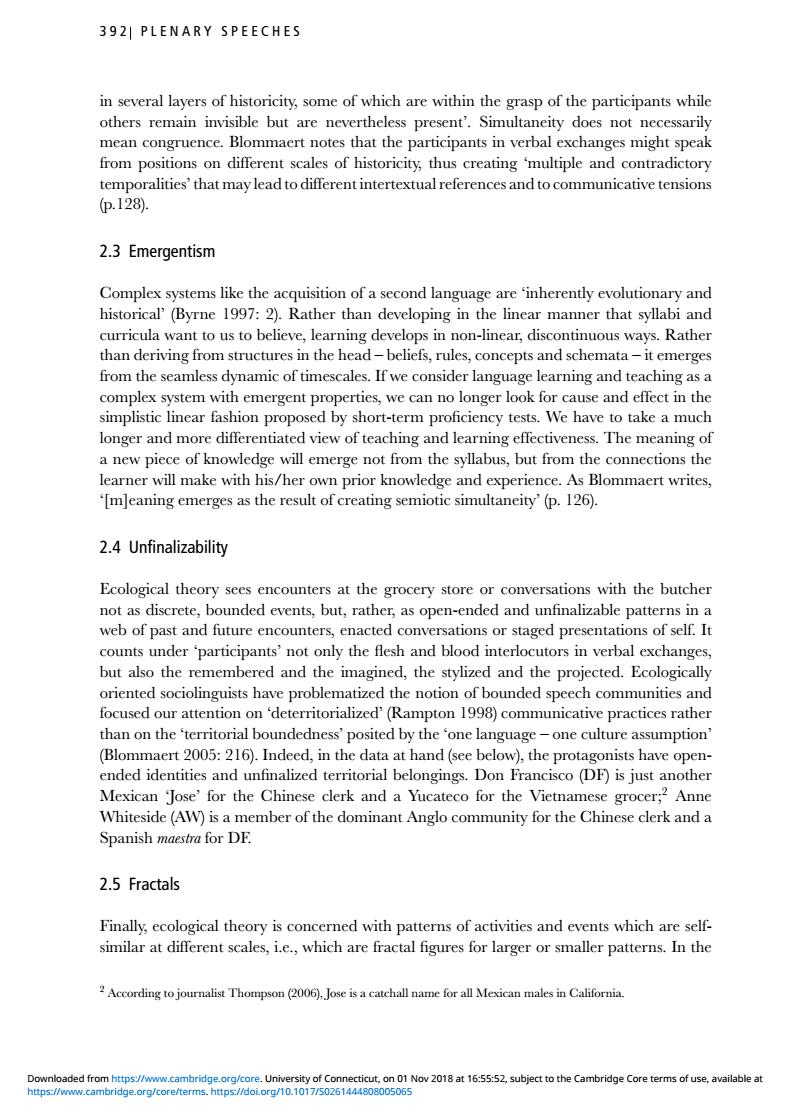正在加载图片...

392 PLENARY SPEECHES in several layers of historicity,some of which are within the grasp of the participants while others remain invisible but are nevertheless present'.Simultaneity does not necessarily rticipants in verbal exchanges might speak on different scales of historicity,thus creating multiple and contradictory temporalities'that may lead todifferent intertextual references and to communicative tensions p.128). 2.3 Emergentism Complex systems like the acquisition of a second language are 'inherently evolutionary and historical(Byrne 1997:2).Rather than developing in the linear manner that syllabi and t to us to believe,le ops in non-linear,discontinuous ways.Rathe than deriving from structures in the head-beliefs,rules,concepts and schemata-it emerges from the seamless dynamic of timescales,If we consider language learning and teaching as a complex system with emergent properties,we can no longer look for cause and effect in the simplistic linear fashion pr oposed by short-term proficiency tests.We have to take a much ning effectiveness.The meaning of a new pie ce of knowledge will emerge not from t e syllabus,but from the connections th learner will make with his/her own prior knowledge and experience.As Blommaert writes, "[m]eaning emerges as the result of creating semiotic simultaneity'(p.126). 2.4 Unfinalizability Ecological theory sees encounters at the grocery store or conversations with the butcher nded events,but,rathe as open-ended and unfinalizable patte web of past and future encounters,en sor staged presentations of self.I counts under 'participants'not only the flesh and blood interlocutors in verbal exchanges but also the remembered and the imagined,the stylized and the projected.Ecologically oriented sociolinguists have problematized the notion of bounded sp ech communities and focused our attention ondeterritorialized'(Rampton 1998)communicative practices rather posited by theo nguag one cult umption 05:216).Indeed,in the data at hand (see below),the protagonists have open ended identities and unfinalized territorial belongings.Don Francisco(DF)is just another Mexican 'Jose'for the Chinese clerk and a Yucateco for the Vietnamese grocer;2 Anne Whiteside (AW)is a member of the dominant Anglo community for the Chinese clerk and a Spanish maestra for DE 2.5 Fractals Finally,ecological theory is concerned with patterns of activities and events which are self- similar at different scales,i.e.,which are fractal figures for larger or smaller patterns.In the According tojournalist Thompson (06)Jose is a catchall name for all Mexican males in California392 PLENARY SPEECHES in several layers of historicity, some of which are within the grasp of the participants while others remain invisible but are nevertheless present’. Simultaneity does not necessarily mean congruence. Blommaert notes that the participants in verbal exchanges might speak from positions on different scales of historicity, thus creating ‘multiple and contradictory temporalities’ that may lead to different intertextual references and to communicative tensions (p.128). 2.3 Emergentism Complex systems like the acquisition of a second language are ‘inherently evolutionary and historical’ (Byrne 1997: 2). Rather than developing in the linear manner that syllabi and curricula want to us to believe, learning develops in non-linear, discontinuous ways. Rather than deriving from structures in the head – beliefs, rules, concepts and schemata – it emerges from the seamless dynamic of timescales. If we consider language learning and teaching as a complex system with emergent properties, we can no longer look for cause and effect in the simplistic linear fashion proposed by short-term proficiency tests. We have to take a much longer and more differentiated view of teaching and learning effectiveness. The meaning of a new piece of knowledge will emerge not from the syllabus, but from the connections the learner will make with his/her own prior knowledge and experience. As Blommaert writes, ‘[m]eaning emerges as the result of creating semiotic simultaneity’ (p. 126). 2.4 Unfinalizability Ecological theory sees encounters at the grocery store or conversations with the butcher not as discrete, bounded events, but, rather, as open-ended and unfinalizable patterns in a web of past and future encounters, enacted conversations or staged presentations of self. It counts under ‘participants’ not only the flesh and blood interlocutors in verbal exchanges, but also the remembered and the imagined, the stylized and the projected. Ecologically oriented sociolinguists have problematized the notion of bounded speech communities and focused our attention on ‘deterritorialized’ (Rampton 1998) communicative practices rather than on the ‘territorial boundedness’ posited by the ‘one language – one culture assumption’ (Blommaert 2005: 216). Indeed, in the data at hand (see below), the protagonists have openended identities and unfinalized territorial belongings. Don Francisco (DF) is just another Mexican ‘Jose’ for the Chinese clerk and a Yucateco for the Vietnamese grocer;2 Anne Whiteside (AW) is a member of the dominant Anglo community for the Chinese clerk and a Spanish maestra for DF. 2.5 Fractals Finally, ecological theory is concerned with patterns of activities and events which are selfsimilar at different scales, i.e., which are fractal figures for larger or smaller patterns. In the 2 According to journalist Thompson (2006), Jose is a catchall name for all Mexican males in California. https://www.cambridge.org/core/terms. https://doi.org/10.1017/S0261444808005065 Downloaded from https://www.cambridge.org/core. University of Connecticut, on 01 Nov 2018 at 16:55:52, subject to the Cambridge Core terms of use, available at